Nurses have taken to picket lines in the biggest day of strike action in the 75-year history of the NHS, as the ongoing row over pay and conditions continues to escalate.
The action, coordinated by the Royal College of Nursing (RCN), will take place at 73 trusts in England, where up to 40,000 will strike.
More than 11,000 ambulance staff who are members of the GMB and Unite unions are also staging walkouts, hitting services across England, Wales and Northern Ireland.
Health leaders have warned of ‘significant disruption’ due to the scale of the action, while ministers have warned that patients’ lives will be put at risk due to delayed care and slower ambulance response times.
Royal College of Nursing members striking at St Thomas’ Hospital in London on February 6
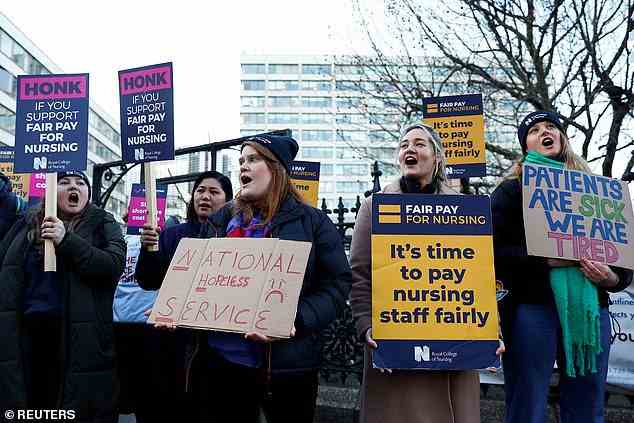
Nurses at St Thomas’ Hospital in London join picket lines on February 6


The RCN is calling for an 18.4 per cent pay rise — based on the current rate of inflation. It would see the average nurses’ salary go from £37,000 to £43,800.
But the union said it would halt the current strike action if the Government meets with its representative to discuss pay.
In a letter to the Prime Minister over the weekend, the RCN’s chief executive Pat Cullen said: ‘Please address this current impasse. I have made clear that opening negotiations and making meaningful offers can avert strike action.’
The Government has insisted its offer of around 4 per cent, or £1,400, is all it can afford. The deal, awarded last year, was backed by the NHS Pay Review Body.
On Friday, the Welsh Government offered NHS staff an extra three per cent pay rise for the current financial year. In response, the RCN scrapped its planned walkouts in the nation this week.
In Scotland, there are no strikes scheduled as the Government is negotiating with the union.
Writing to Rishi Sunak, Ms Cullen said: ‘Your government looks increasingly isolated in refusing to reopen discussions about the 2022-23 NHS pay award.
‘As a result, the strike action for England remains — with tens of thousands of nurses losing wages to ensure you hear their voice. It must not be in vain.
‘It will be the biggest day of industrial action in the 75-year history of the NHS. Nursing staff find that a sobering realisation of how far they have been pushed to protect patient care and secure some respect for the nursing profession.
‘I’m urging you to reset your Government in the eyes of the public and demonstrate it is on the side of the hardworking, decent taxpayer. There could be no simpler way to demonstrate this commitment than bringing the nurse strike to a swift close.’
But Health Secretary Steve Barclay said the strikes are ‘regrettable’ and will ‘undoubtedly’ impact patients and cause delays to services, despite NHS bosses putting contingency plans in place.
He said: ‘We accepted the recommendations of the independent pay review body to give over 1million NHS workers, including nurses and ambulance workers, a pay rise of at least £1,400 this financial year, on top of an increase the previous year when wider public sector pay was frozen.
‘I have been having constructive talks with unions about what is affordable for 2023/24, and urge them to call off the strikes and come back around the table.’
The nurses’ strikes today will hit 73 trusts in England, marking the most so far after walkouts in December were staged at 44 trusts and those in January affect 55 trusts.
Nurses will strike again on Tuesday, while physiotherapists are taking action on Thursday and more ambulance workers join picket lines on Friday.
Tens of thousands more appointments and operations are expected to be cancelled, adding to the 88,000 disrupted by the strikes so far.
Maria Caulfield, minister for mental health and women’s health strategy, urged the RCN to call off the strikes and warned patients lives would be put at risk the longer action rumbled on.
She said: ‘There is a risk to patients the longer that strikes go on.
‘So if your operation is cancelled the first time, there is probably a minimum risk.
‘If that’s cancelled time and time again because of ongoing strikes, then patients become more poorly and there is always a risk.
‘And with ambulance strikes, if someone’s having a heart attack or a stroke, that does increase someone’s risk the longer that response time is.’
Ms Caulfield, who is also a nurse and member of the RCN, told Times Radio that the Health Secretary had met with health unions ‘virtually on a weekly basis during January’ to talk about the pay award for 2023/24.
She added: ‘We are very happy to talk about the forthcoming year’s pay award, which is exactly what they’ve done in Scotland and the RCN have called off the strikes as a result.’
Asked if those talks would also look at pay for 2022/23, Ms Caulfield replied: ‘In Scotland, they are not discussing last year’s pay either, so that’s my point, we are in the same place as Scotland.
‘In England, what the unions have done is withdrawn from the independent pay review process, which doesn’t help at all because we want to submit our evidence, put our case about what is affordable and what we are willing to offer but also the unions need to do that too as they did last year.’
Ms Caulfield told GB news that she has a ‘lot of sympathy’ for striking nurses but said the Government has ‘responsibility to the taxpayer’ to follow the independent pay review process.
She added: ‘It is difficult for us now if we are to give a pay (rise) to nurses, we would have to look at teachers, ambulance drivers.
‘We just can’t afford inflation-busting pay rises that the unions are currently demanding.’
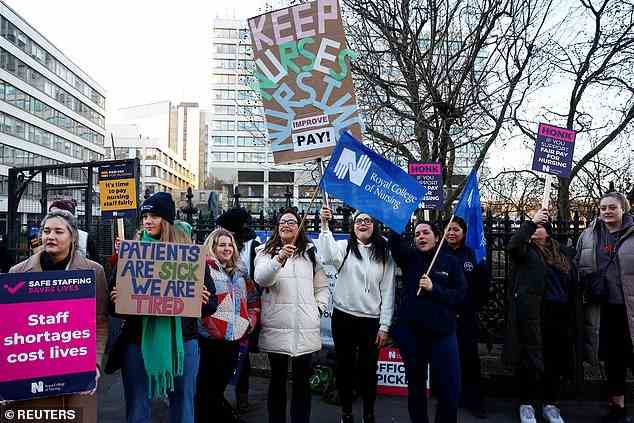
Royal College of Nursing members striking at St Thomas’ Hospital in London on February 6
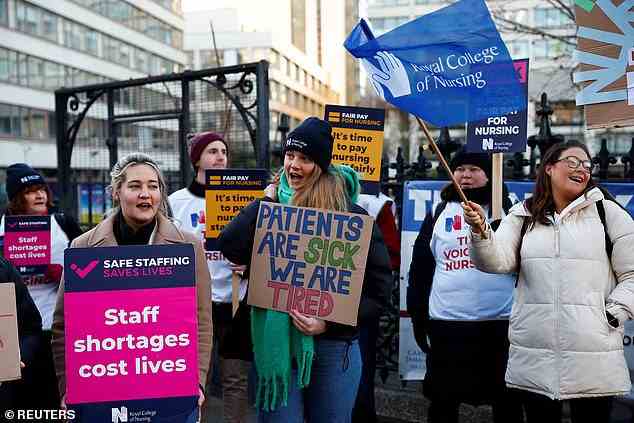
Nurses at St Thomas’ Hospital in London join picket lines on February 6
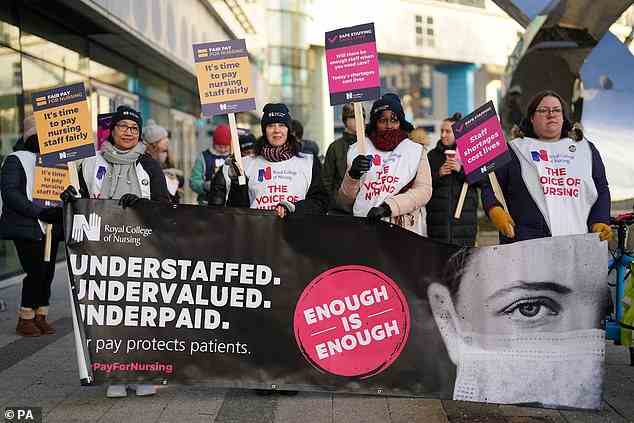
NHS staff striking outside Queen Elizabeth hospital in Birmingham on February 6
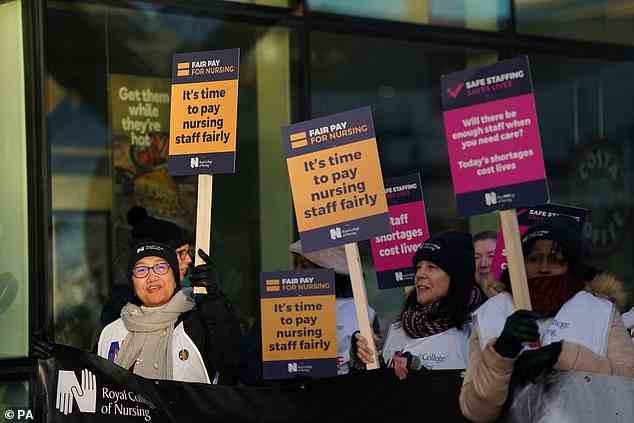
NHS staff striking outside Queen Elizabeth hospital in Birmingham on February 6
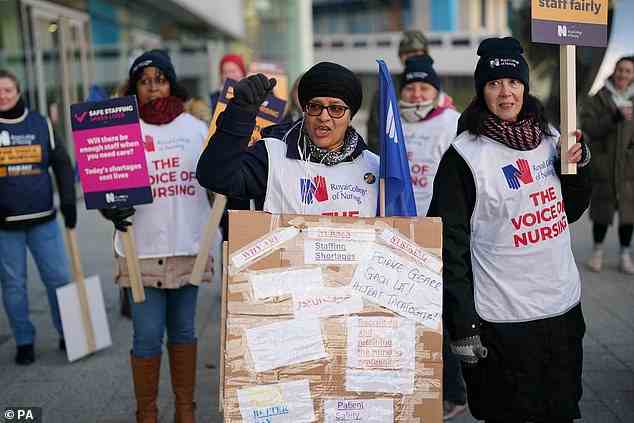
NHS staff striking outside Queen Elizabeth hospital in Birmingham on February 6
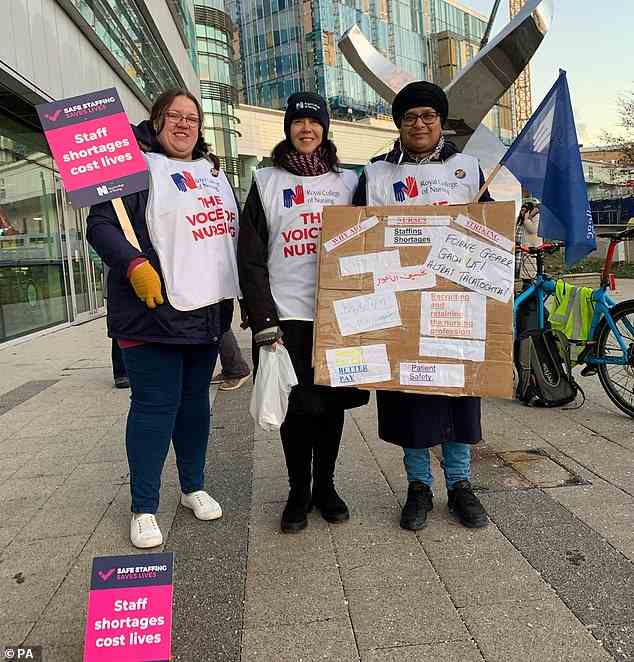
NHS medics on the picket line outside Queen Elizabeth hospital in Birmingham on February 6
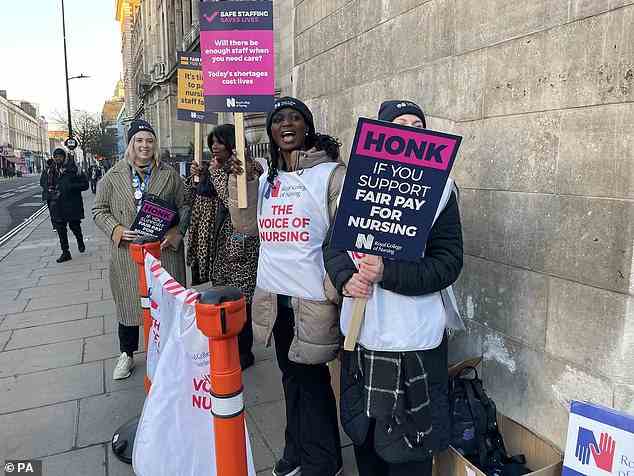
NHS medics taking industrial action at St Mary’s Hospital in London on February 6
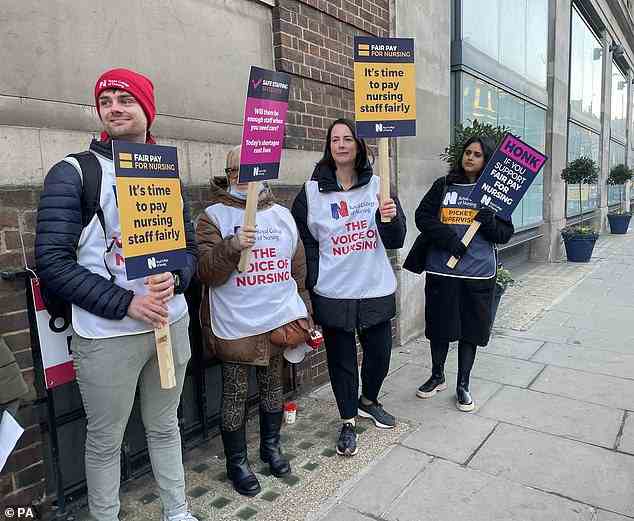
NHS medics taking industrial action at St Mary’s Hospital in London on February 6
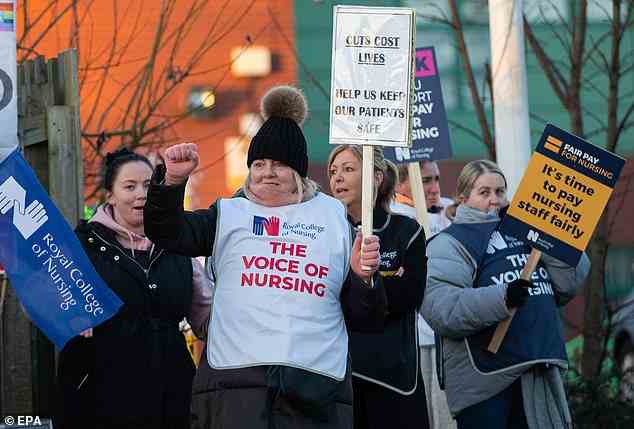
Striking nurses picket outside the Walton Centre in Liverpool on February 6
Joining the nurses, almost 9,000 ambulance staff — including paramedics, emergency care assistants and call handlers — who are members of the GMB union will walkout across England.
And more than 2,600 paramedics who are members of Unite will take action in the North West, North East, East Midlands, West Midlands, Wales and Northern Ireland.
Major pickets — including Brighton, Liverpool, Harrogate and Gateshead — will see 999 crews line up alongside nurses.
Unions have committed to providing ‘life and limb’ emergency cover on strike days.
Workers across the ambulance service voted to strike over the Government’s 4 per cent pay award.
Rachel Harrison, GMB national secretary, said: ‘It’s been almost a month since the Government engaged in any meaningful dialogue – instead, they’ve wasted time attempting to smear ambulance workers.’
She added: ‘The NHS is crumbling; people are dying and this Government is dithering.
‘The public back ambulance workers. The Government needs to wake up and talk pay now.’
Sharon Graham, general secretary of the Unite union, called on Mr Sunak and Mr Barclay to open negotiations on pay or face a ‘constant cycle’ of walkouts.
Speaking from a picket in Wales, she said the Government has not discussed pay at ‘any time’ and it is the only way to end the dispute.
Ms Graham said: ‘That’s what needs to happen. Until that happens, we are in this constant cycle of having strike action, which obviously nobody wants.
‘Our members do not want to be on strike. They want to be at work serving the country.’
She added: ‘They can’t just always sing “la la la la la” and hope that the year goes by and we will forget what’s happened. This year’s pay needs to be addressed.
‘But this is part of the problem – I’m not sure that they understand how to negotiate, maybe Rishi Sunak is not up to the job.’
Unite is the only NHS union staging walkouts in Wales today, after others called off planned strikes after the Welsh Government offered an improved pay offer of an extra 3 per cent on Friday.
Ms Graham said Unite is ‘tantalisingly close’ to a deal but the ‘sticking point’ is that half of the pay increase is a one-off payment.
She said: ‘What we’re simply asking is to put more of that on the wages, so that people have that forever, it’s in their pay packet, because that will address some of the concerns.’
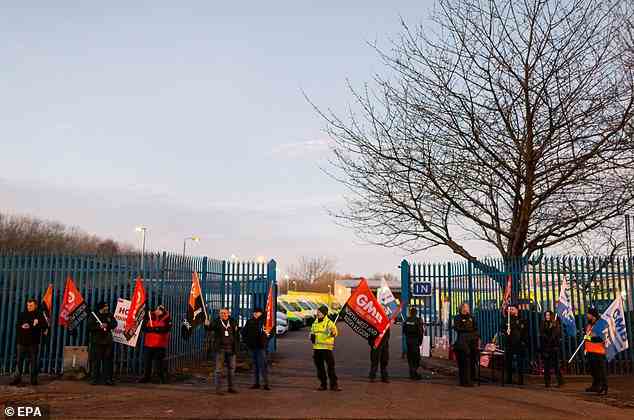
Striking GMB ambulance workers picket outside Fazakerley Ambulance Station in Liverpool on February 6
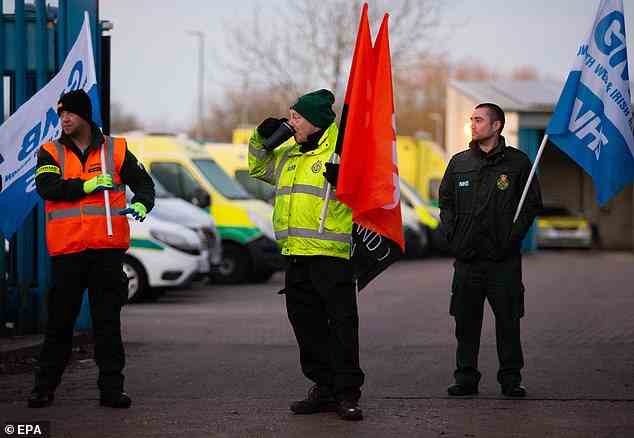
Striking GMB ambulance workers picket outside Fazakerley Ambulance Station in Liverpool on February 6
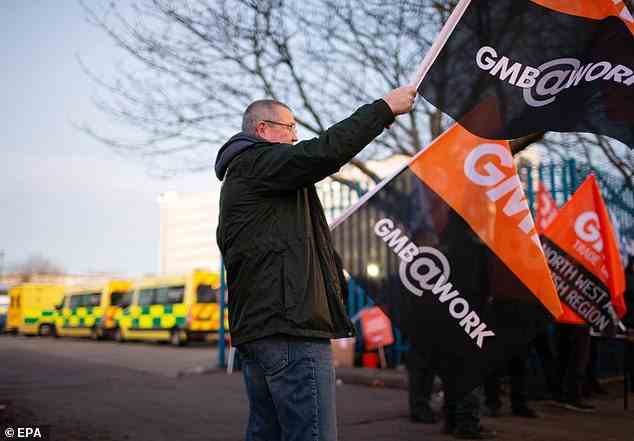
Striking GMB ambulance workers picket outside Fazakerley Ambulance Station in Liverpool on February 6
Sir Julian Hartley, chief executive of NHS Providers, told BBC Radio 4’s Today programme: ‘Today represents a very significant moment.
‘Having both ambulance workers and nurses out means that the logistical planning exercise for trusts has been a significant one.’
With fewer ambulances on the road and nurses in hospital, bosses have been working to discharge patients from hospital and rebook both surgery and outpatient appointments, he said.
Sir Julian said: ‘We do expect to have significant disruption in terms of planned care, outpatients and electives, but obviously making sure we deliver the priority of patient safety for urgent and emergency care.’
He called on the Government to open talks with nurses and warned strikes ‘really takes away’ from clearing the record backlog and the emergency care recovery.
Sir Julian added: ‘We can’t go on with a series of industrial action that really takes away from focusing on those prioritise.
‘I can’t overstate the amount of work that goes on in organisations to manage and mitigate for industrial action. Our focus needs to be on delivering for patients as the NHS in those key areas.’

